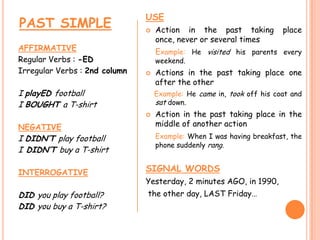Report
Share

More Related Content
What's hot (20)
Similar to Past simple - past continuous
Similar to Past simple - past continuous (9)
More from saroaibanez
More from saroaibanez (19)
Past simple - past continuous
- 1. PAST SIMPLE AFFIRMATIVE Regular Verbs : -ED Irregular Verbs : 2nd column I playED football I BOUGHT a T-shirt NEGATIVE I DIDN’T play football I DIDN’T buy a T-shirt INTERROGATIVE DID you play football? DID you buy a T-shirt? USE Action in the past taking place once, never or several times Example: He visited his parents every weekend. Actions in the past taking place one after the other Example: He came in, took off his coat and sat down. Action in the past taking place in the middle of another action Example: When I was having breakfast, the phone suddenly rang. SIGNAL WORDS Yesterday, 2 minutes AGO, in 1990, the other day, LAST Friday…
- 2. PAST CONTINUOUS (WAS/WERE + -ING) AFFIRMATIVE I /She/He WAS playING football You/They WERE fishING NEGATIVE I /She/He WASN’T playING football You/They WEREN’T fishING INTERROGATIVE WAS she / he playING football? WERE you/they fishING? USE Action going on at a certain time in the past Example: When I was having breakfast, the phone suddenly rang. Two actions happening at the same time (in the past) Example: While she was preparing dinner, he was washing the dishes. SIGNAL WORDS When, while, as long as, yesterday at 6 o’clock…